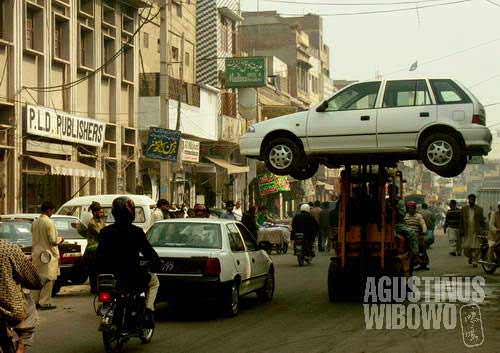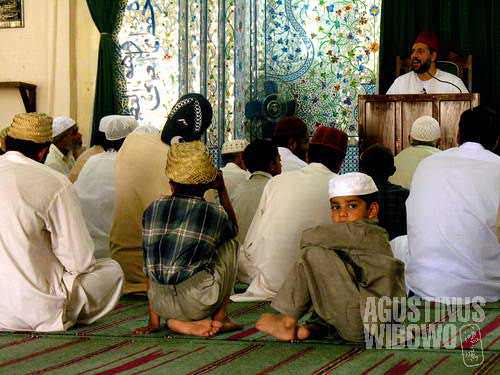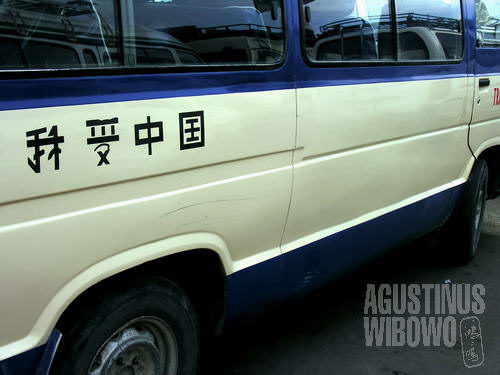Lahore – Do You Know that ….?
April 26, 2006

Watch out!
Some interesting things that make Pakistan differ from Indonesia. Do you know that:
1. It’s better not to plan your shopping day in Pakistan on Sundays
Because all shops, hmm, maybe not all, but most, closed on Sundays. It’s bizzare that Sunday is the only holiday in the week, and it’s the chance for office workers to shop. But, eh, all of the shops are closed. Only food maybe is easy to find on Sundays, but not any other things. I am still thinking that the habit of people sleeping and staying at homes on Sundays was made by the closing shops, or it is the other way round. Once I asked a friend, whether it was only on Sundays that people can go shopping, as in other days they busy for works. He answered, “they are not busy at all any other days, hmm…, you know how we Pakistanis work”
Sundays are also not good time for shopping in Indonesia, but for contrary reason: the bazaars and malls are too crowded on weekends.
2. Pakistan has six working days
Yes, and the only holiday is Sunday. But it was not always like this. Once, under the rule of President Zia-ul-Haq, the holiday was shifted to Friday, to get in the same track with other Muslim countries. After Zia went down, the holiday was returned back to Sunday. Thus, Saturday is still a normal working day here. Students go to school, and banks are open.
3. Women dont go to mosques
It might be bizarre for Indonesians that most mosques in Pakistan dont admit women. Moreover, women dont do funeral namaz (sholat jenazah). The concept of purdah, veiling, is very strong in Pakistan. This is what then came to sexual seggregration. There is always special place for women: special seats in buses, special tables and rooms in restaurants, special parking lot for women, separate universities and schools, and Pakistan even has women bank. The purdah concept is deep in the heart, that women usually wear completely covering clothes. Even some Pakistani men may comment that many of the women dont cover properly, but for Indonesian standard the veil and hejab is already the maximum can be imagined.
4. No music, please
During azan prayer calls, turn off all of your music equipments. No music, please. Also no reading books. For women, most will rearangge their hejab/dupata properly during the prayers calls.
5. Colourful Number Plate
In Pakistan, except just started in Islamabad and Karachi, there is no standard number plate system. All vehicle owners are free to make their own plate numbers, go to bazaar and make their own design. I felt that it was indeed bizzare to see that every car has its own style of plate number. Once I pointed this to my Lahori friend, due to fact that people can make their own number easily, then they can make fake number and commit crime, he just realized my point.
Talking about transport, Pakistan trucks and buses are famous in the world as the most decorative ones. Too decorative that it was difficult for the passengers to see the world outside. My Malaysian friend used to complain that she always passed the stop because she couldnt see the road outside the window, as the window was full of decorative flowers. Even the driver couldnt check his mirror and relied the life on the assistant. The decoration was colourful, but somehow little bit too much. But it’s also bizzare that they make the buses and trucks as colourful heaven, but when it comes to clothes everybody goes back again to concept of modesty.

Most mosques are not for women
6. Indonesians dont go for marriage before performing Hajj
This is a common belief among Pakistanis. Many of them have heard that Indonesians dont go for wedding before performing Hajj pilgrimage. Some of them asked for my confirmation. I said that it was impossible, that the quota for Indonesians each year for going Hajj is only 200,000 jamaah (the biggest number on earth), and the population is reaching 230 million. If it was true, then most Indonesians wont go for marriage at all in their life. Many Pakistanis went to Saudi Arabia and Middle East for Hajj and work, and there they saw that Indonesians were everywhere, then they might falsely think that all Indonesians had been to Middle East. But another guy in Lahore told me, that the information that Indonesians dont go for marriage before Hajj was written in history books. A complete myth in history books….
Talking about similar myths, most people accepted that Indonesia was the biggest Muslim country and Malaysia was the only modern Islamic country, then they assumed all Indonesians and Malaysians were Muslims. This assumption is so common. Further assumption, Indonesia was Islamic state. It was difficult to explain that our government was not a Muslim government.
“So your government is Christian?” asked a Lahori surprised.
“No… our government is not based on any single religion,” said me.
“But Sukarnoputri is not Muslim?” he questioned again. In Pakistan, Muslims have Muslim names, Hindus have Hindu names. And obviously ‘Sukarnoputri’ is not a Muslim name, it’s Sanskrit actually. But in Indonesia many Muslims also have Hindu names, a friend of mine even combined the Hindu and Muslim name, his name is Achmad Vishnu, a Muslim.
7. Hug me… hug me…
It’s a customary in Pakistan for giving greeting by hugging each other, of course for members of the same sexes. For male friends, a meeting is usually started by hugging each other, sometimes emphasized with cheek meets cheek, then continued by handshaking. The greetings in Pakistan always including asking for news (apa kabar, kya hal hai). Then it is answered by sentences like, thanks to God, I am fine. Sometimes I felt it is quite impractical even when I ask strangers for directions on the street, I have to start it by asking his health, his family’s health, his parents health, etc, then I can ask, “OK bhaijan, please tell me the way to …”. But this friendly customary makes Pakistan special.
Adding to hugging, it’s also normal between friends (of the same sex) to walk hand in hand, something that if done by boys in Indonesia would be regarded as gayish. Kissing on cheek is also normal between friends. My Gilgit friend, Mirza, said that it was because no girlfriends to practise kissing. But I regarded it as mere justification.
8. Siti Nurbaya Weddings in Pakistan
Well, this might be not new information, that most weddings in this country, as well as in India and other countries in Sub-continent, is arranged marriage. Arranged marriage, what in Indonesia we call as weddings a la Siti Nurbaya, is still regarded favorable and respectable. People in the villages even said that love marriages is immoral and embarassing. In big cities like Islamabad and Lahore, love marriages are getting common among youngsters, but still they are minority. Due to
How arranged marriages work? In villages, the bride and groom even never meet each other, not even exchanging photos and telephone calls. The one who is going to sit next to you on the wedding throne is decided from heaven.
Due to purdah, usually the bride is also invisible, especially in conservative areas. The wedding guests are also separated between sexes.
Wedding a la Siti Nurbaya
9. Surprise…. There is no Playboy Magazine in Pakistan
Indonesia is the first Muslim populated country to publish its own Playboy Magazine (just bearing the name, the content is no nudity at all in fact), but it wouldnt be happenned in Pakistan. In fact when Indonesia made so much noise with its Draft of Law against Anti Pornographic and Pornoaction (Indonesian made English word, means porno things which come into actions), there were demonstrations supporting and against the law. In Indonesia, actually there are more voices to against this draft, to make the definition of pornography according to a certain religion and put women clothing as the object. But in Pakistan, a conservative Islamic republic, the news on the newspapers were only showing that Indonesians supporting the law and urged the government to apply as soon as possible.
10. Father’s Name
Pakistani Muslims use Muslim names (that’s why they dont understand why Indonesian presidents all having non Muslim names). The normal Pakistani names usually countains at least 3 words, with one word showing family or caste, like Khan, Butt, Kazmi, etc. They also usually ask for father’s name when registering someone, like in official documents or even hotel registrations. Why father’s name? I suspect that the normal name is not enough to differentiate, as similar names between people are common, especially when their names contains Muhammad, Ali, Ahmad, or Abdul. Even name plus father name is sometimes not enough. Once when I worked with the NGO registering the villagers, we found two people with exactly same name and exactly same father’s name. Only the ID Card Number can be used to see the different entries then.
11. Gym Fever
Yeah…, bodybuilding fever has come to Pakistan. Everywhere in Peshawar you might see advertisement of gyms, with pictures of heavily muscled cartoon figures. And on the street in Lahore and Peshawar, you might easily see young Pakistanis with Greek Gods’ bodies. Iqbal, 21, a Lahori, told me that it was due to Indian movies, whose famous stars like Salman Khan and Shahrukh Khan are also heavily muscled.

“I love China”
12. Chinese Letters, Anybody?
The Pakistanis admire the Chinese of being their best friend. But whether or not because of this, many of public transport cars, Suzukis, tongas, Isuzus, and Qingqis, were mostly decorated by a line of Chinese characters, sometimes also Japanese. For them, Chinese, Japanese, and Korean are the same anyway. But for me, who knows Chinese characters, the sentence they usually put on the car body was unitelligible, with strange way of writing (obviously written by non Chinese painters), sometimes up-side down, sometimes just a collection of Pakistani-made Chinese-imaginative characters, with God knows what means. The creativity was unquestionable. But again, what means.






Leave a comment